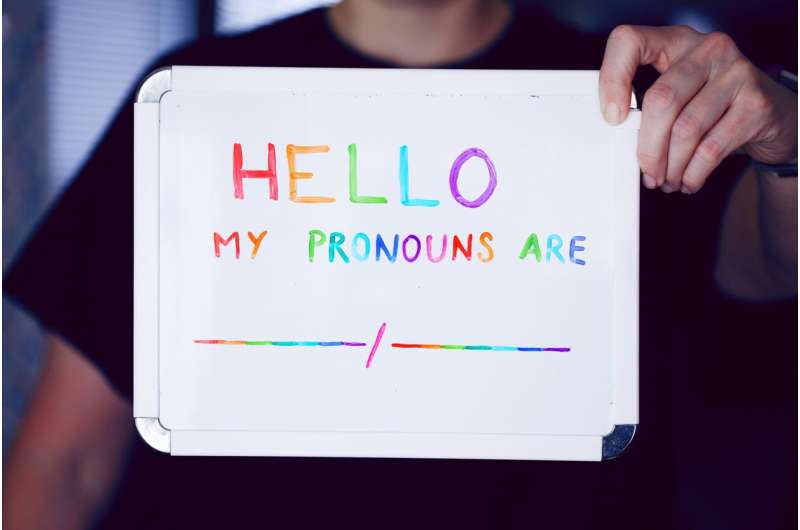Importance of gender-affirming school culture to reduce peer victimization among gender-nonconforming youth
Gender nonconforming youth are often subject to bullying and harassment, but the negative effects of this experience are not well understood. Previous studies have found that gender-nonconforming youth are at heightened risk of depression, social withdrawal and avoidance behavior compared to gender-conforming youth. The association between gender nonconformity and psychological distress has been found to be more common among adolescent boys than girls. Both heterosexual and sexual-minority individuals can be subject to victimization based on their gender expression, regardless of their actual sexual orientation.
Dr. Randolph Chan Chun-ho, Associate Head and Associate Professor at the Department of Special Education and Counseling, The Education University of Hong Kong (EdUHK), conducted a study to determine whether gender nonconformity contributes to peer victimization in school settings and to identify ways to modify the school environment to protect gender nonconforming youth from victimization. The study, published in Psychology of Violence, involved 3,020 students in 10 secondary schools in different provinces in the mainland, 51.5% of whom assigned male at birth and 48.5% assigned female at birth. The mean age of the participants was 15.71.
One fifth of the participants (19.6%) said they frequently experienced peer victimization. The prevalence of peer victimization was even higher among gender-nonconforming youth (38.5%). The three most common forms were being reminded to watch the way in which they speak or dress, being verbally assaulted or threatened, and being socially excluded or isolated. Gender nonconformity was found to be a risk factor for peer victimization among youth in the mainland and was associated with heightened levels of school avoidance and symptoms of depression.
Youth assigned male at birth who violated masculine gender roles were found to be more frequently subject to victimization than youth assigned female at birth who did not adhere to feminine gender roles. In schools with a highly structured and supportive campus climate, gender-nonconforming youth were less likely to experience peer victimization and internalizing problems.
Fostering a respectful, peer-supported, engaging school climate can alleviate the psychosocial difficulties arising from gender nonconformity among students of all genders, the study concluded. Given the prevalence of symptoms of depression in gender-nonconforming youth, mental health care is urgently needed to provide gender-affirming psychological support for this vulnerable population in Chinese education settings.
Randolph C. H. Chan, Gender nonconformity, peer victimization, and internalizing problems among youth: Differential moderating effects of school climate by sex assigned at birth, Psychology of Violence (2022). DOI: 10.1037/vio0000441
Provided by
The Education University of Hong Kong (EdUHK)
Citation:
Importance of gender-affirming school culture to reduce peer victimization among gender-nonconforming youth (2022, September 20)
retrieved 20 September 2022
from https://phys.org/news/2022-09-importance-gender-affirming-school-culture-peer.html
This document is subject to copyright. Apart from any fair dealing for the purpose of private study or research, no
part may be reproduced without the written permission. The content is provided for information purposes only.

Gender nonconforming youth are often subject to bullying and harassment, but the negative effects of this experience are not well understood. Previous studies have found that gender-nonconforming youth are at heightened risk of depression, social withdrawal and avoidance behavior compared to gender-conforming youth. The association between gender nonconformity and psychological distress has been found to be more common among adolescent boys than girls. Both heterosexual and sexual-minority individuals can be subject to victimization based on their gender expression, regardless of their actual sexual orientation.
Dr. Randolph Chan Chun-ho, Associate Head and Associate Professor at the Department of Special Education and Counseling, The Education University of Hong Kong (EdUHK), conducted a study to determine whether gender nonconformity contributes to peer victimization in school settings and to identify ways to modify the school environment to protect gender nonconforming youth from victimization. The study, published in Psychology of Violence, involved 3,020 students in 10 secondary schools in different provinces in the mainland, 51.5% of whom assigned male at birth and 48.5% assigned female at birth. The mean age of the participants was 15.71.
One fifth of the participants (19.6%) said they frequently experienced peer victimization. The prevalence of peer victimization was even higher among gender-nonconforming youth (38.5%). The three most common forms were being reminded to watch the way in which they speak or dress, being verbally assaulted or threatened, and being socially excluded or isolated. Gender nonconformity was found to be a risk factor for peer victimization among youth in the mainland and was associated with heightened levels of school avoidance and symptoms of depression.
Youth assigned male at birth who violated masculine gender roles were found to be more frequently subject to victimization than youth assigned female at birth who did not adhere to feminine gender roles. In schools with a highly structured and supportive campus climate, gender-nonconforming youth were less likely to experience peer victimization and internalizing problems.
Fostering a respectful, peer-supported, engaging school climate can alleviate the psychosocial difficulties arising from gender nonconformity among students of all genders, the study concluded. Given the prevalence of symptoms of depression in gender-nonconforming youth, mental health care is urgently needed to provide gender-affirming psychological support for this vulnerable population in Chinese education settings.
Randolph C. H. Chan, Gender nonconformity, peer victimization, and internalizing problems among youth: Differential moderating effects of school climate by sex assigned at birth, Psychology of Violence (2022). DOI: 10.1037/vio0000441
Provided by
The Education University of Hong Kong (EdUHK)
Citation:
Importance of gender-affirming school culture to reduce peer victimization among gender-nonconforming youth (2022, September 20)
retrieved 20 September 2022
from https://phys.org/news/2022-09-importance-gender-affirming-school-culture-peer.html
This document is subject to copyright. Apart from any fair dealing for the purpose of private study or research, no
part may be reproduced without the written permission. The content is provided for information purposes only.
